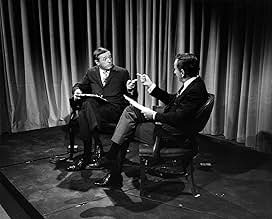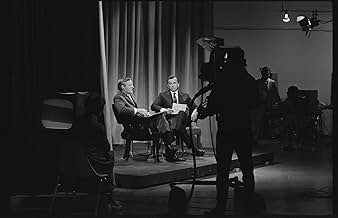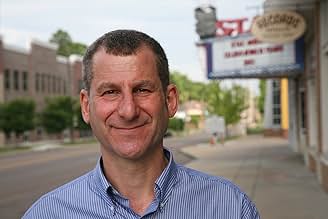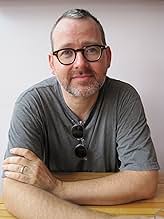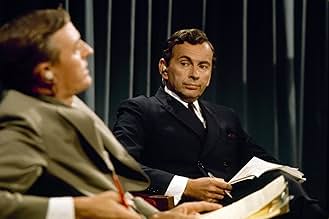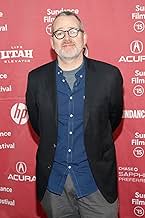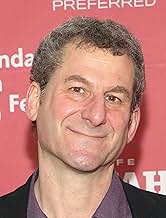IMDb RATING
7.6/10
6.6K
YOUR RATING
A documentary on the series of televised debates in 1968 between liberal Gore Vidal and conservative William F. Buckley.A documentary on the series of televised debates in 1968 between liberal Gore Vidal and conservative William F. Buckley.A documentary on the series of televised debates in 1968 between liberal Gore Vidal and conservative William F. Buckley.
- Directors
- Writers
- Stars
- Awards
- 6 wins & 27 nominations total
Gore Vidal
- Self - Debater
- (archive footage)
William F. Buckley
- Self - Debater
- (archive footage)
Noam Chomsky
- Self
- (archive footage)
Patricia Buckley
- Self - Buckley's Wife
- (archive footage)
Sam Donaldson
- Self - Correspondent, ABC News
- (archive footage)
Howard K. Smith
- Self - Anchor, ABC News
- (archive footage)
- Directors
- Writers
- All cast & crew
- Production, box office & more at IMDbPro
Featured reviews
A well-constructed must-see documentary for anyone who is the least bit interested in the politics of journalism. Don't worry that you won't recall/aren't aware of the background. The filmmakers do an excellent job of setting the stage, and an even more impressive job of avoiding the actual political issues in order to focus on the medium. If you want to know how we got where we are, start at the beginning. This is the genesis of punditry and personality-driven journalism. This is not to say that this little slice of evolution is necessarily bad. As the film points out, prior to 1968 the presentation of news was quite static, with little, if any, chance for anything out of the mainstream to make it out of the studio. Now the genie has been loosed from the bottle, and he has truly been feeling his oats for the past several years. It's up to us to rein him in, give him focus, and pray that we can find some common ground before the growing political mitosis reaches the point of no return.
Gavel-to-gavel coverage of the Republican and Democratic national conventions was still being offered by CBS and NBC in 1968, but ABC, lacking their resources, limited their coverage to a few hours in the evening and highlighted it with a ten-night debate between conservative author and commentator William F. Buckley Jr. and flamboyant liberal novelist and playwright Gore Vidal. These debates are chronicled in the powerful documentary Best of Enemies directed by Robert Gordon ("Johnny Cash's America") and Morgan Neville ("Twenty Feet From Stardom").
In addition to fully restored original broadcast footage, the film includes commentaries from people who knew Buckley and Vidal such as former TV talk show host Dick Cavett, journalist Frank Rich, authors Christopher Hitchens and Andrew Sullivan, Buckley biographer Sam Tanenhaus, Vidal's last magazine editor, Matt Tyrnauer among others, while actors Kelsey Grammar and John Lithgow read passages from the writings of both men.
Though both men had previously run for public office (Vidal for Congress, Buckley for Mayor of New York), their forte was not politics but writing. Buckley was the founder and editor of the influential conservative magazine The National Review, and Vidal was a controversial novelist and playwright whose sexually liberated views were in evidence in his novels "The City and the Pillar" and "Myra Breckinridge." Both men spoke in the accents of Eastern elites, what Neil Buckley, Bill's surviving brother, describes as "patrician, languid accents," yet both were erudite with acid tongues.
To say that Buckley and Vidal did not get along is like saying Bobby Kennedy and James Hoffa were not the best of friends. Vidal knew that Buckley had supported using nuclear weapons against North Vietnam and China, and called him "a bloodthirsty neurotic," while Buckley retorted, "We all know that your tendency is to be feline." The Democratic Convention was held in Chicago where protests against the Vietnam War and the subsequent police overreaction threatened to derail the nominating process, creating a highly-charged atmosphere for the debates that only enhanced the acrimony.
One of the highlights occurred in the ninth of ten debates where the debaters clashed over the extent of the police response against the demonstrators and both stepped out of their well-calculated cool, intellectual personas. The discussion began with the revelation that the police had removed a Viet Cong flag from the demonstration. While Vidal defended the right of the demonstrators to state their political views, Buckley noted that during World War II, people were free to ostracize pro-Nazi spokesman even though they were free to speak their views. Vidal responded by saying that "the only sort of crypto-Nazi I can think of is yourself." Though the moderator Howard K. Smith warned both men against name calling, a red-faced Buckley, his hands trembling, shouted, "Now listen, you queer, stop calling me a crypto-Nazi or I'll sock you in your goddamn face, and you'll stay plastered." It was a moment that Buckley regretted, though the feud continued with competing articles in Esquire Magazine and subsequent law suits. Best of Enemies is provocative and terrific entertainment but while the edited debates are pure theater, full of witty banter and relentless thrusts and parries, they are less than illuminating as a contribution to the troubling issues of the time and include no discussion of the most important issue of the day, the Vietnam War.
Although issues such as economic inequality, foreign involvements, and issues of morality and culture were discussed, the debates were not a conflict over positions on issues as much as they were a battle between two individuals convinced the other was a threat to the health and well-being of the country.
Many commentators in the film are full of nostalgia for the day when intellectuals were seen on television and point to today's cable news pundits screaming at each other (rather than the corporatization of the media and the over-dependence on ratings) as evidence of the decline of American television, but if the Buckley-Vidal debates are an example of the intellectual vitality of television in the sixties, I think I'd rather stick with Rachel Maddow.
In addition to fully restored original broadcast footage, the film includes commentaries from people who knew Buckley and Vidal such as former TV talk show host Dick Cavett, journalist Frank Rich, authors Christopher Hitchens and Andrew Sullivan, Buckley biographer Sam Tanenhaus, Vidal's last magazine editor, Matt Tyrnauer among others, while actors Kelsey Grammar and John Lithgow read passages from the writings of both men.
Though both men had previously run for public office (Vidal for Congress, Buckley for Mayor of New York), their forte was not politics but writing. Buckley was the founder and editor of the influential conservative magazine The National Review, and Vidal was a controversial novelist and playwright whose sexually liberated views were in evidence in his novels "The City and the Pillar" and "Myra Breckinridge." Both men spoke in the accents of Eastern elites, what Neil Buckley, Bill's surviving brother, describes as "patrician, languid accents," yet both were erudite with acid tongues.
To say that Buckley and Vidal did not get along is like saying Bobby Kennedy and James Hoffa were not the best of friends. Vidal knew that Buckley had supported using nuclear weapons against North Vietnam and China, and called him "a bloodthirsty neurotic," while Buckley retorted, "We all know that your tendency is to be feline." The Democratic Convention was held in Chicago where protests against the Vietnam War and the subsequent police overreaction threatened to derail the nominating process, creating a highly-charged atmosphere for the debates that only enhanced the acrimony.
One of the highlights occurred in the ninth of ten debates where the debaters clashed over the extent of the police response against the demonstrators and both stepped out of their well-calculated cool, intellectual personas. The discussion began with the revelation that the police had removed a Viet Cong flag from the demonstration. While Vidal defended the right of the demonstrators to state their political views, Buckley noted that during World War II, people were free to ostracize pro-Nazi spokesman even though they were free to speak their views. Vidal responded by saying that "the only sort of crypto-Nazi I can think of is yourself." Though the moderator Howard K. Smith warned both men against name calling, a red-faced Buckley, his hands trembling, shouted, "Now listen, you queer, stop calling me a crypto-Nazi or I'll sock you in your goddamn face, and you'll stay plastered." It was a moment that Buckley regretted, though the feud continued with competing articles in Esquire Magazine and subsequent law suits. Best of Enemies is provocative and terrific entertainment but while the edited debates are pure theater, full of witty banter and relentless thrusts and parries, they are less than illuminating as a contribution to the troubling issues of the time and include no discussion of the most important issue of the day, the Vietnam War.
Although issues such as economic inequality, foreign involvements, and issues of morality and culture were discussed, the debates were not a conflict over positions on issues as much as they were a battle between two individuals convinced the other was a threat to the health and well-being of the country.
Many commentators in the film are full of nostalgia for the day when intellectuals were seen on television and point to today's cable news pundits screaming at each other (rather than the corporatization of the media and the over-dependence on ratings) as evidence of the decline of American television, but if the Buckley-Vidal debates are an example of the intellectual vitality of television in the sixties, I think I'd rather stick with Rachel Maddow.
"You have to have a mind of winter to see nothing that is not there and nothing that is"
- Wallace Stevens 'The Snowman'
"Best of Enemies" (2015 release; 88 min.) is a documentary about the infamous 10 televised debates that took place during the 1968 Republican and Democratic Presidential Conventions (in Miami and Chicago, respectively), between conservative William Buckley Jr. and liberal Gore Vidal. As the documentary opens, Vidal is commentating about old pictures hanging up in his house and one of them is showing Buckley and Vidal at one of those debates. We then get some background as to who these 2 guys are, and why ABC veered away to bring the "unconventional Convention" coverage. And then we get to the first debate... To tell you more would spoil your viewing experience, you'll just have to see for yourself how it all plays out.
Couple of comments: this documentary is co-directed by Morgan "20 Feet From Stardom" Neville and Robert Gordon, who is affiliated with the Heritage Foundation, a conservative think-tank. If you think that means the documentary is kinder to Buckley that to Vidal, think again. The two men are pitted against each other, and vehemently disdain each other, even before these debates, and much more so afterwards. "It was a confrontation of life styles", as someone comments. Yes, it was, but as it turns out, these debates had another unexpected consequence: ABC's ratings went through the roof, and the other mainstream networks quickly realized they had to have their own versions of these "point-counterpoint" programs. In other words, the Buckley-Vidal debates set into motion what would eventually become the Fox's and MSNBC's news channels. Apart from the historical legacy created by these debates, the documentary also examines the long shadows cast be the debates over the personal lives of both Vidal and (even more so) Buckley. If you have any interest in politics and/or in TV history, you will not want to miss this documentary. It makes for completing viewing, period.
"Best of Enemies" made quite a splash at the Sundance film festival earlier this year. The movie's been out for months and I didn't think it would reach theaters here in Cincinnati, but then out of the blue t showed up this weekend at my local art-house theater here. I figured this would not be playing very long and went to see it right away, The matinée screening where I saw this at turned into a private screening, as in: I literally was the only person in the theater. A shame, as this is a riveting documentary. If you get the chance to see this, be it in the theater, on VOD or eventually on DVD/Blu-ray, do not mist it! "BEst of Enemies" is HIGHLY RECOMMENDED!
Couple of comments: this documentary is co-directed by Morgan "20 Feet From Stardom" Neville and Robert Gordon, who is affiliated with the Heritage Foundation, a conservative think-tank. If you think that means the documentary is kinder to Buckley that to Vidal, think again. The two men are pitted against each other, and vehemently disdain each other, even before these debates, and much more so afterwards. "It was a confrontation of life styles", as someone comments. Yes, it was, but as it turns out, these debates had another unexpected consequence: ABC's ratings went through the roof, and the other mainstream networks quickly realized they had to have their own versions of these "point-counterpoint" programs. In other words, the Buckley-Vidal debates set into motion what would eventually become the Fox's and MSNBC's news channels. Apart from the historical legacy created by these debates, the documentary also examines the long shadows cast be the debates over the personal lives of both Vidal and (even more so) Buckley. If you have any interest in politics and/or in TV history, you will not want to miss this documentary. It makes for completing viewing, period.
"Best of Enemies" made quite a splash at the Sundance film festival earlier this year. The movie's been out for months and I didn't think it would reach theaters here in Cincinnati, but then out of the blue t showed up this weekend at my local art-house theater here. I figured this would not be playing very long and went to see it right away, The matinée screening where I saw this at turned into a private screening, as in: I literally was the only person in the theater. A shame, as this is a riveting documentary. If you get the chance to see this, be it in the theater, on VOD or eventually on DVD/Blu-ray, do not mist it! "BEst of Enemies" is HIGHLY RECOMMENDED!
Best of Enemies is a fascinating documentary film about a series of nationally televised debates in 1968 between two public intellectuals, the liberal Gore Vidal and the conservative William F. Buckley Jr. If that doesn't sound very interesting you couldn't be more wrong. This is a film about two men who absolutely hated each other. Two extremely clever men who fought each other live on television by debating with each that eventually led to personal insults being thrown at each other and it's mesmerising viewing. I have to admit I had never heard of these men before and that's probably because these debates happened a couple of months before I was born but I do know now and I feel much better off for it.
Did you know
- TriviaThe film-makers shot an interview with Gore Vidal, but ultimately decided not to use it, so he only appears in archive footage.
- Quotes
Richard Wald: ABC was the third of the three networks. It would've been fourth, but there were only three.
- Crazy creditsThere is a short scene after the credits showing footage of an interview with Buckley.
- ConnectionsEdited into Independent Lens: Best of Enemies (2016)
- How long is Best of Enemies: Buckley vs. Vidal?Powered by Alexa
Details
- Release date
- Country of origin
- Official site
- Language
- Also known as
- Best of Enemies
- Production companies
- See more company credits at IMDbPro
Box office
- Budget
- $1,000,000 (estimated)
- Gross US & Canada
- $892,802
- Opening weekend US & Canada
- $50,378
- Aug 2, 2015
- Gross worldwide
- $892,802
- Runtime
- 1h 27m(87 min)
- Color
Contribute to this page
Suggest an edit or add missing content


